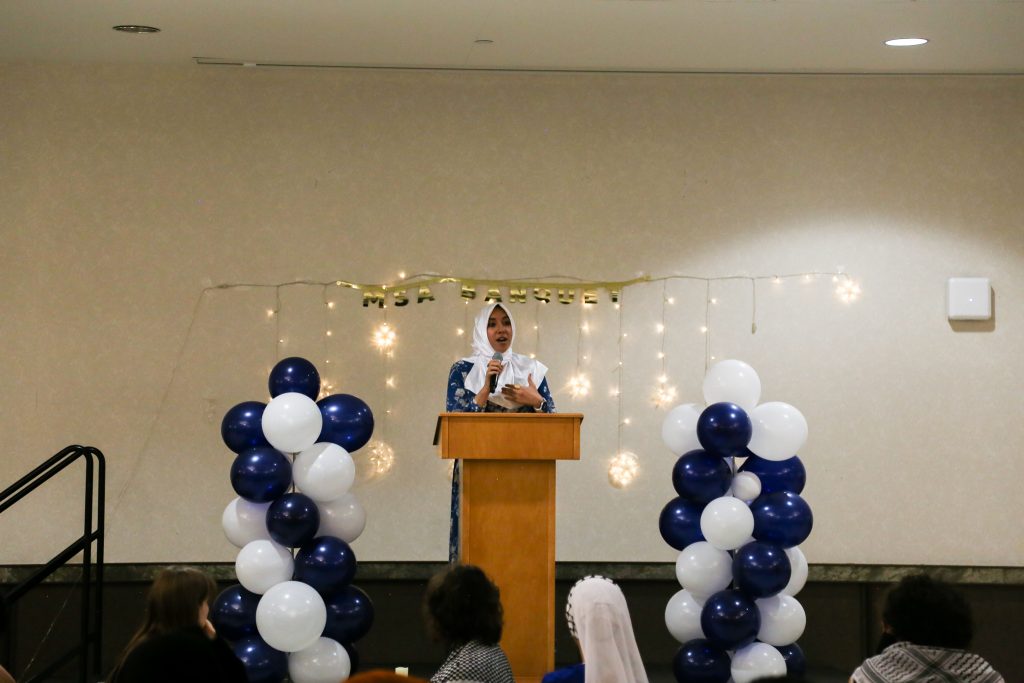The Binghamton University Muslim Student Association (MSA) presented their Winter Banquet this past Sunday in Old Union Hall, with the aim of bringing the Muslim community together and raising funds for humanitarian aid in Gaza. The night featured words from guest speaker Marwa Assar and poetry recitations from BU students.
MSA opened the banquet with remarks and introductions from MSA’s E-Board. The topic for this semester’s banquet, “Reviving Ourselves Spiritually and Emotionally,” was created with the intention of emphasizing community and resilience in times of hardship. MSA has contributed $600 in aid for Gaza from banquet ticket sales alone, with 50 percent of the total sales going toward relief for Palestinians.
Yasmeen Gilani, vice president of MSA and a senior majoring in global public health, elaborated upon the theme of the banquet and its significance to the Muslim community.
“‘Reviving ourselves spiritually and emotionally’ is essentially intended to provide students with some guidance and suggestions for how they can recharge themselves as this semester begins in the [middle] of the many tragedies that are occurring overseas and the rise of hate crimes against Muslims due to the dehumanization of Muslims and Arabs in prominent media networks,” Gilani wrote in an email.
This semester’s Winter Banquet is the current installment of MSA’s annual banquets, with this banquet having the unique distinction of being held in the spring. The theme of blue and gold adorned Old Union Hall, with multicultural organizations including the Pakistani Student Association, The Indian International Student Union and Students for Justice in Palestine in attendance.
MSA’s E-Board prepared for this semester’s banquet by working together through food, entertainment and decorating committees, reaching out to speakers and choosing a color theme, according to Gilani. Maahidul Islam, public relations of MSA and a junior majoring in biochemistry, discussed the outcome of the E-Board’s hard work.
“At the end of the day, it’s super satisfying to see this event come to life,” Islam said. “We have this event every year. We try to better it every year.”
For the second portion of the event, MSA invited guest speaker Assar to the stage. Founder of the H.O.M.E. Institute and a spiritual teacher, Assar is also an adjunct professor at Boston Islamic Seminary and psychologist at the Islamic Center of NYU. With 15 years of experience in the field of psychology, Assar’s work takes a psychological approach according to the Islamic faith. Her book, “The Compass Home: The Heart Over Mind & Ego (H.O.M.E.) Method,” is forthcoming.
At the Winter Banquet, Assar discussed the importance of authenticity, intentionality and gratitude in our fast-paced society. Assar addressed the disconnect between people’s actions and their values, while emphasizing the importance of nourishing the soul rather than focusing only on material goals.
“That’s the part of us that can’t be seen or touched, but yet is very much alive within all of us, and you could feel its presence when you do things that nourish you,” Assar said during the event. “When you do things that actually have value and meaning in your lives, you walk away feeling full — you walk away feeling like you got what you needed from that.”
Assar also spoke to the trying times of the current day, emphasizing the value of appreciation for things that we often take for granted. She provided examples such as the ability to walk, see or attend school, conveying the Islamic idea of a “higher level of gratitude.”
“In the Quran, there’s a verse that says, ‘Be grateful to me. I shall increase you,’” Assar said. “And this is something that many Muslims live by — that we know and we experience. That whenever we are grateful to God for what we have, we find that very thing that we are grateful for increases.”
The concluding portion of the Winter Banquet included poetry recitations by BU students, followed by a banquet dinner.
Nabihah Khan, intern for MSA and a junior majoring in integrative neuroscience, explained her hopes for attendees of the banquet, whether they are part of MSA or any other multicultural organization.
“I hope they can understand what MSA is all about,” Khan said. “You don’t have to be Muslim, you don’t have to be religious at all, to be part of our family.”
MSA is dedicated to supporting the Muslim community worldwide through fundraising and coming together around Islamic values, according to Gilani. Islam reflected on the significance of this banquet for MSA and the broader University community.
“I’m hoping we’re able to foster an environment of community, kinship, friendship,” Islam said. “We want peace in this world and it’s … helpful to hold an event like this, so we can just get together, eat food, listen to a speech and just enjoy ourselves.”



